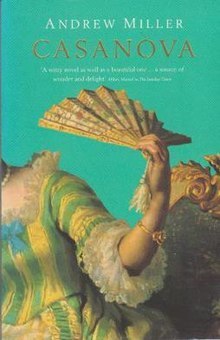
Casanova
Book Description
Caught in the dazzling whirl of 18th-century Venice, a notorious lover grapples with the tumult of desire and deception. Andrew Miller’s "Casanova" thrusts readers into a world where passion ignites and betrayal lurks around every corner. As the seductive charms of the city draw the infamous libertine deeper into a labyrinth of intrigue, he confronts the shadows of his past and the ghosts of his heart. Friendship, ambition, and an insatiable quest for freedom collide in a tale that pulses with tension and allure. Will he be able to escape the web of his own making, or will love prove to be his ultimate downfall?
Quick Book Summary
"Casanova" by Andrew Miller immerses readers in the opulent yet treacherous world of 18th-century Venice, tracing the journey of the infamous Giacomo Casanova. A relentless seeker of pleasure, Casanova navigates a city ablaze with sensuality and intrigue, all while haunted by memories and past betrayals. As he entangles himself in fresh romances and political conspiracies, he is forced to confront the costs of his restless desires. The line between love and manipulation blurs as Casanova reckons with fractured friendships, quests for freedom, and the shadows cast by his own reputation. Ultimately, the novel becomes a meditation on identity, longing, and whether true freedom can be found within the constraints of society and the human heart.
Summary of Key Ideas
Table of Contents
Desire and Deception in 18th-Century Venice
Casanova, renowned for his charm and indiscretions, carves a flamboyant path through 18th-century Venetian society. His days are filled with the city’s spectacles: masked balls, shadowy alleys, and encounters with equally ambitious men and women. Miller paints Venice as a city that is both a playground and a prison, filled with opportunity for those bold enough to seize it, but rife with danger for the reckless. Against this backdrop, Casanova’s exploits are at once exhilarating and precarious, the city’s dazzling beauty masking undercurrents of risk and corruption.
The Complexity of Love and Identity
Throughout the novel, desire serves as both motivator and undoing. Casanova’s intricate affairs are depicted not just as conquests but as moments of vulnerability. He grapples with authenticity in relationships, often questioning whether true intimacy is possible or merely an illusion within his world of masks and manipulation. As his liaisons deepen, lingering wounds from old loves and betrayals resurface, complicating his search for genuine connection and affirming that pleasure and heartache are inextricably linked.
The Trap of Reputation and Legacy
Navigating the volatile waters of Venetian politics and society, Casanova becomes ensnared in a web woven from secrets and ambitions. His notoriety, once a source of empowerment, begins to restrict and haunt him. Miller shows how Casanova’s very reputation for freedom and seduction limits his choices, forcing him to act parts he no longer wishes to play. Friendships become fraught with suspicion, and enemies capitalize on his vulnerabilities, placing him in ever more perilous situations.
Friendship, Loyalty, and Betrayal
As the story unfolds, questions of identity and freedom become central. Casanova’s restless pursuit of pleasure is revealed as an attempt to escape the emptiness he feels inside. He confronts the ghosts of his past, examining the nature of his desires and whether any path leads to lasting fulfillment. Miller’s narrative explores how the drive for autonomy collides with the realities of societal roles and personal demons, suggesting that the price of escape may be higher than Casanova imagined.
The Pursuit of Freedom and Self-Discovery
The climax of the novel weaves together themes of love, betrayal, and self-realization. Casanova’s experiences force him to reconsider what truly matters: fleeting indulgence, or a deeper form of connection and understanding. By the end, he is irrevocably changed, having seen both the glory and the tragedy that follow in the wake of his choices. Miller leaves readers reflecting on the eternal human yearning for meaning, even within a world defined by chaos and desire.
Download This Summary
Get a free PDF of this summary instantly — no email required.





